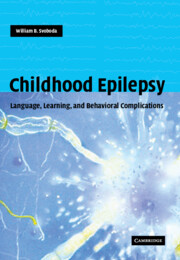Book contents
- Frontmatter
- Contents
- Preface
- Glossary
- 1 Looking ahead
- Part I Speech and language problems
- 2 Language: the challenge
- 3 Speech, language, and communication
- 4 Speech and language problems in epilepsy
- 5 Seizure types and speech and language risks
- 6 Language regression with epilepsy syndromes
- 7 Other epilepsy language syndromes
- 8 Seizure-management effects
- 9 Evaluation of speech and language problems
- 10 Management of speech and language problems in epilepsy
- 11 Behavior consequences
- Part II Learning problems
- Part III Behavior problems
- Index
- References
2 - Language: the challenge
from Part I - Speech and language problems
Published online by Cambridge University Press: 26 October 2009
- Frontmatter
- Contents
- Preface
- Glossary
- 1 Looking ahead
- Part I Speech and language problems
- 2 Language: the challenge
- 3 Speech, language, and communication
- 4 Speech and language problems in epilepsy
- 5 Seizure types and speech and language risks
- 6 Language regression with epilepsy syndromes
- 7 Other epilepsy language syndromes
- 8 Seizure-management effects
- 9 Evaluation of speech and language problems
- 10 Management of speech and language problems in epilepsy
- 11 Behavior consequences
- Part II Learning problems
- Part III Behavior problems
- Index
- References
Summary
Communication is the exchange of ideas and feelings. The main avenue of communication is language, in many forms, both verbal and non-verbal. Verbal language is the code of learning and underlies much of emotional development. If there is no means of communication, there exists limited learning and scant socialization. Language is among the highest of evolutionary skills. The developing brain may sacrifice other higher cognitive abilities to preserve the ability to communicate.
So intricate and fragile is this ability that many worldly woes emanate from gender differences, age dissimilarities, societal variants, and national differences in mother tongues. Far greater is the betrayal of an ability that is distorted or lost due to a brain insult or to epilepsy. The individual is frustrated, as are the parents, teachers, and social contacts.
Are speech and language problems a part of epilepsy?
Dr Frank M. C. Besag, noted, “If children have seizures, then they are particularly liable to language deficits.” He asked, “What is it about having seizures that should determine that language deficits specifically occur?” In the same discussion, Dr Bruce Hermann commented, “There is not much work on language” (Besag & Hermann, 2001).
Failure to communicate accurately or adequately underlies many of the problems experienced in families, in school, in social interactions, and in employment. Some children with epilepsy do not communicate well. They experience subtle and often variable language problems. They may misunderstand or they may be misunderstood. Such misunderstandings distort emotional development, educational efforts, and later earning.
- Type
- Chapter
- Information
- Childhood EpilepsyLanguage, Learning and Behavioural Complications, pp. 11 - 16Publisher: Cambridge University PressPrint publication year: 2004



